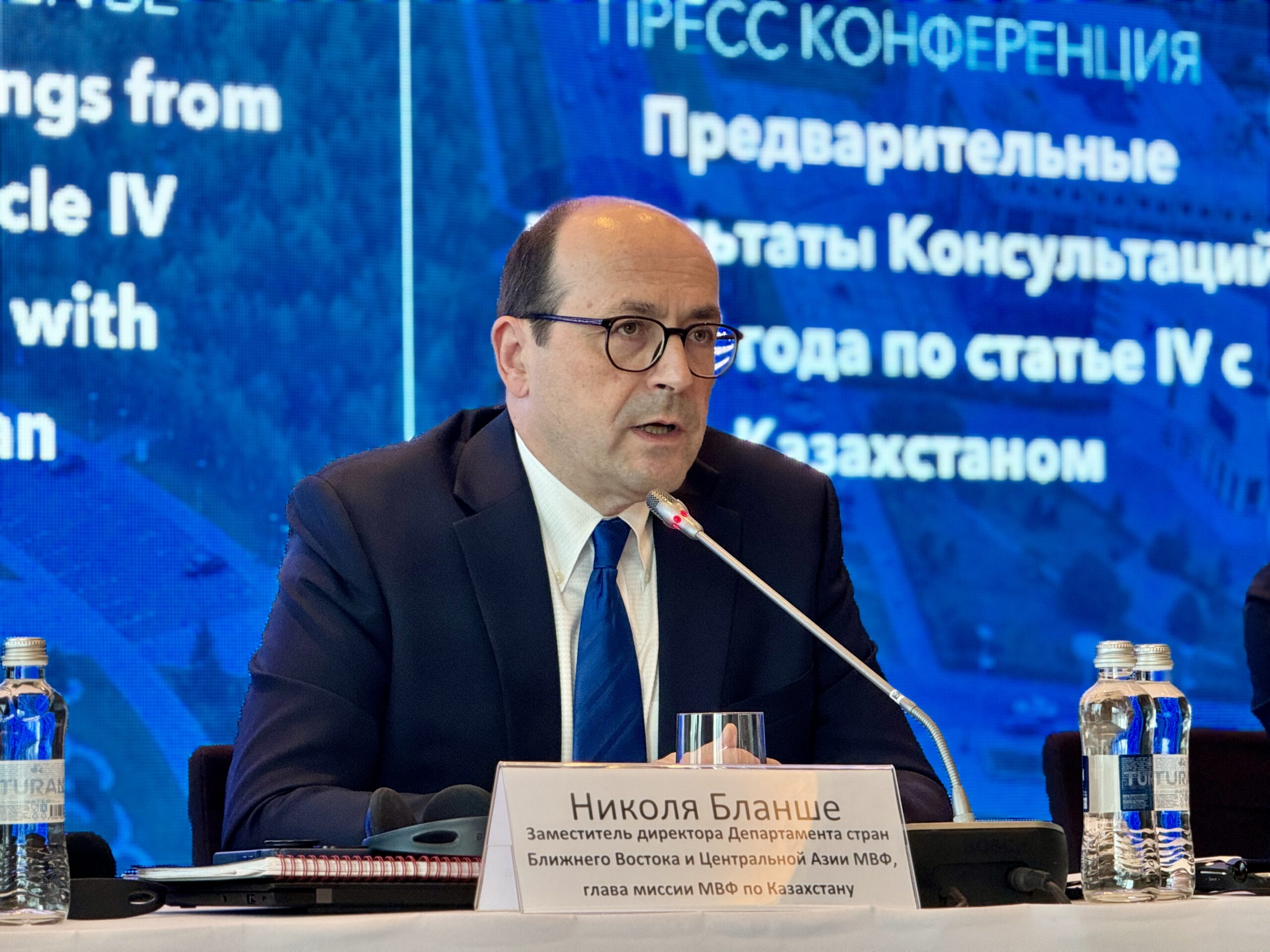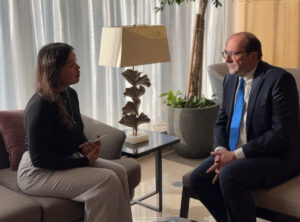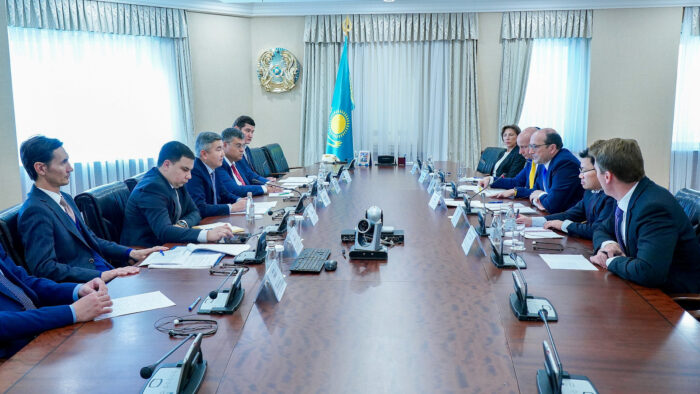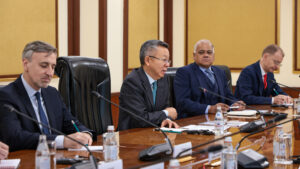ASTANA — Head of the International Monetary Fund (IMF) mission in Kazakhstan, Nicolas Blancher, recently spoke to The Astana Times, discussing the structural reforms the country needs and its efforts to curb inflation. According to Blancher, Kazakhstan’s ambitious target of 6% economic growth is within reach, but only if the country implements bold and decisive reforms.

Nicolas Blancher. Photo credit: Assel Satubaldina/ The Astana Times
IMF recently completed Article IV consultations with Kazakhstan. Its concluding statement indicates economic activity remained strong in 2024, with a gradual decline in inflation. IMF staff project GDP growth at 3.9% for the year, down from 5.1% in 2023, largely due to increased public spending.
Inflation eased to 8.4% in August and is expected to drop slightly to 8.3% by year-end. Externally, a current account deficit of 1.3% of GDP is anticipated for 2024.

The Astana Times journalist Assel Satubaldina and Nicolas Blancher during an interview. Photo credit: Aida Dosbergenova/ The Astana Times
What kind of immediate reforms are needed?
One of the IMF’s critical recommendations for Kazakhstan is to step up the implementation of structural reforms. While the country has made strides in stabilizing the economy in recent years, it faces growing challenges that require bolder reforms and a shift toward a more dynamic and private sector-led model.
“[Structural reforms] are a longer-term way to adjust the economy so that it can diversify and grow more in the long term. This has to do with what will drive productivity, job creation, and activity in the economy. Our view is that this cannot be only, or even mostly, driven by public spending or public investment. Our view is that there is a need for bold reforms to leave space to the private sector,” said Blancher.
Over the years, Kazakhstan has sought to balance economic diversification with its reliance on hydrocarbons. The government has pushed several initiatives to skew away from oil and gas, but progress has been slow. State-owned enterprises still dominate key sectors, and a complex regulatory environment can deter private investments.

Blancher met with Deputy Prime Minister – Minister of National Economy Nurlan Baibazarov in October to discuss the partnership. Photo credit: primeminister.kz
“Why the private sector? Because the private sector has more resources to invest than the public resources, which are limited. Two, because the private sector is more efficient. Once there are the conditions for it, which means, basically, competition. Competition is a key engine of efficiency. These two factors are our priority,” said Blancher.
He emphasized the need for a more competitive and transparent business environment. “The state should reduce its footprint in the economy. By footprint, I mean ownership of companies, but also reducing the subsidies, reducing the exemptions, and reducing the various forms of interventions that create a climate that is not competitive and that creates a non-level playing field for companies to operate,” he explained.
He stressed the importance of enhancing the quality of regulations, eliminating corruption, and fostering transparency and competition to create the right environment for growth.
With these reforms in place, Blancher is sure it will be a “major drive for growth,” including creating jobs and industries. According to him, achieving the 6% growth target set by the President of Kazakhstan Kassym-Jomart Tokayev, will require “much bolder reforms” than have been seen so far.

IMF Deputy Managing Director Bo Li was on his official visit to Kazakhstan in October, meeting senior government officials. Photo credit: primeminister.kz
“When I say – we would advise for bolder reforms – I mean that we don’t see the reforms progressing fast enough. To be frank, we see some backtracking or rolling back some of the reforms in some areas. As I mentioned, subsidy programs have been increasing. We have seen some restrictions on trade, which is a problem, for example, in attracting foreign investors or diversifying the economy,” Blancher explained.
He also raised concerns about preferential treatment for domestic producers, particularly in local procurement processes.
“There is a practice where priority is given to local producers over external people who bid for public contracts. There are also various advantages in some sectors, for example, in agriculture. Some local producers have an advantage over any other foreign potential investor,” he said, adding that this approach hampers competition and discourages foreign investment.
Efforts to counter inflation
Kazakhstan has made progress in slowing down its inflation, from nearly 20% in 2023 to 8.3% as of September. The Monetary Policy Report published by the National Bank of Kazakhstan in August indicates that inflation dynamics are “developing according to the forecasts of the National Bank.”
Blancher noted that the IMF has been “very supportive” of the monetary policy stance of the country’s central bank, highlighting Kazakhstan is “on track.”
“We have been very supportive of the monetary policy stands decided by the NBK. Why? Because inflation was around 20% early last year, it is 8.4% today as of August. We project it to decline a little bit more by the end of this year. The country is on track. It has to continue to reduce inflation,” said Blancher.
He stressed the need to keep the tight monetary policy to bring inflation down to its target of 5%. “Because we need to get to that five to stabilize the economy and establish full confidence in stability,” he added, addressing why inflation has not been declining as quickly as expected.
According to him, there are two main reasons for this. One positive factor is the increase in domestic utility and energy tariffs, which the IMF views as a necessary reform, particularly in the context of climate change preparedness.
However, the second factor, fiscal expansion, poses challenges. “There is a repeated fiscal deficit, and this is like pushing the accelerator and trying to push the brake pedal at the same time. It is not coordinated, and it is creating problems that make it more difficult and costly to reduce inflation,” said Blancher.
He called for more fiscal discipline moving forward. This includes the implementation of tax reforms, which are seen as essential for stabilizing the economy in the long term.
In its concluding statement, the IMF also raised concerns about rising transfers from the National Fund to cover government spending, particularly in light of large-scale public investments and social programs. Kazakhstan’s fiscal position remained stable, thanks in part to its substantial National Fund, which has provided a buffer during times of economic stress. However, the current spending patterns could become unsustainable.
